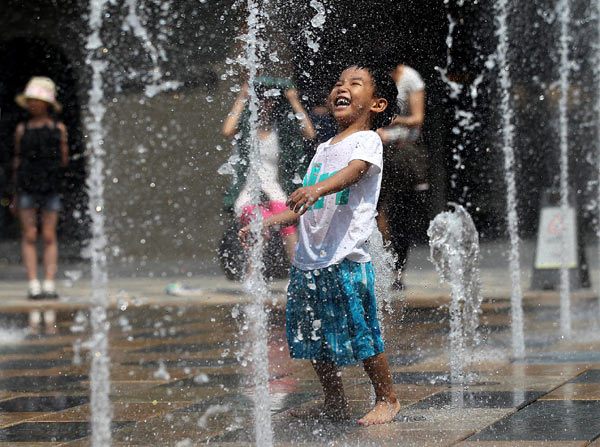Draft protects workers from high temperatures
Updated: 2012-05-28 07:43
By Chen Xin (China Daily)
|
||||||||
Chinese workers will have a shorter workday if the temperature hits 37 C, thanks to a draft regulation.
The draft, made by China's top work safety watchdog, the health ministry, human resources and social security ministry and the top labor union organization, will replace an outdated version that became effective in 1960.
 |
|
Tian Xiaoshuan, a 5-year-old boy, plays at a fountain square at Beijing's Sanlitun shopping center on Sunday. The highest temperature on the day hit 34 C. Wang Jing / China Daily |
The draft, which for the first time defines high temperatures as being above 35 C, has just closed its soliciting of public opinions.
It stipulates that employers should not make pregnant women work outdoors where the temperature is above 35 C or indoors where the temperature is above 33 C.
It also widens the old regulation's beneficiaries from industrial, transportation and construction workers and farmers to all laborers who would be affected by the high temperature at their work.
The draft lists sunstroke at work as an occupational disease and says it will be covered by work injury insurance when diagnosed as work injury.
In China, employers are responsible for employees' work injury insurance, which covers treatment fees and compensation.
Employers should not ask laborers to work outdoors if the temperature is above 40 C. Employees are not allowed to work outdoors longer than five hours or between midday and 3 pm when the mercury hovers at 37 to 40 C, according to the draft.
Workers can discuss and sign collective contracts with employers about labor protection in high temperature conditions.
Employers should grant subsidies to workers who are exposed to extreme heat or high temperatures, the draft says.
Employers should not deduct or lower workers' pay if employees suspend working or reduce work time because of high temperatures.
Ye Jingyi, a labor law expert at Peking University, welcomes the new regulation.
The old regulation mainly stipulates ways to cool down high temperatures at some specific workplaces and it lacks detailed clauses on workers' rights during extreme weather, she said.
Ye said that in the past employers could make excuses, saying the temperature was not too high, when it was extremely hot, because there was no definition of high temperature.
"Now workers will have a specific temperature at which point they are entitled to heat protection," she said.
Chen Xianlian, a worker at a motor component plant in Southwest China's Chongqing, said: "There is no thermometer in my workshop but the temperature there can get as high or even higher than it is outside in the hottest seasons, when it gets up 40 C".
Chen said that although her company would give workers anti-sunstroke medicines and drinking water to protect them, it could still get very uncomfortable in the workshop, which has no air conditioning, only electric fans.
"I stand close to a big furnace, and I am always sweating at work in summer," she said.
Chen could receive around 50 yuan ($8) a month in the summer as high temperature subsidy, but she said many workers in other workshops who are also exposed to heat, though maybe not as high as hers, do not get the subsidy.
"The new regulation will be big good news for us," she said. "We're expecting higher subsidies, because the amount now is too low."
Contact the writer at chenxin1@chinadaily.com.cn

 Relief reaches isolated village
Relief reaches isolated village
 Rainfall poses new threats to quake-hit region
Rainfall poses new threats to quake-hit region
 Funerals begin for Boston bombing victims
Funerals begin for Boston bombing victims
 Quake takeaway from China's Air Force
Quake takeaway from China's Air Force
 Obama celebrates young inventors at science fair
Obama celebrates young inventors at science fair
 Earth Day marked around the world
Earth Day marked around the world
 Volunteer team helping students find sense of normalcy
Volunteer team helping students find sense of normalcy
 Ethnic groups quick to join rescue efforts
Ethnic groups quick to join rescue efforts
Most Viewed
Editor's Picks

|

|

|

|

|

|
Today's Top News
Health new priority for quake zone
Xi meets US top military officer
Japan's boats driven out of Diaoyu
China mulls online shopping legislation
Bird flu death toll rises to 22
Putin appoints new ambassador to China
Japanese ships blocked from Diaoyu Islands
Inspired by Guan, more Chinese pick up golf
US Weekly

|

|







